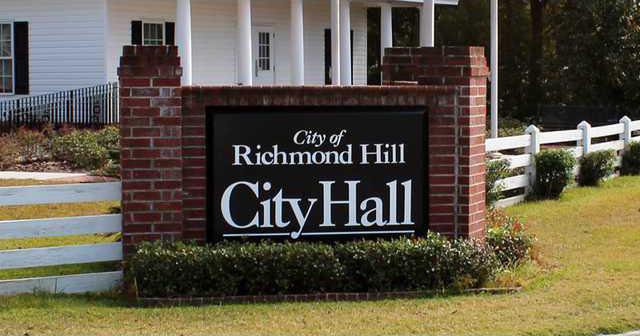More than 4,800 water and sewer customers in Richmond Hill will see their bills go up again in January if the city follows through on measures aimed at helping pay for a new $24 million wastewater treatment plant.
Connection fees imposed on new homes may also be affected under proposals unveiled at a public hearing Tuesday night at City Hall prior to the city’s regular council meeting.
The city could vote on whether to approve the new rates at its next meeting, but without the increases Richmond Hill will be running a massive shortfall in its water and sewer fund in a decade, according to engineer C.J. Chance with Hussey, Gay, Bell & DeYoung.
“If you keep your rate structure … as it is today, you’ll have a $25 million shortfall in 2025,” Chance said.
His recommendations were the result a six-month study into the city’s current rates and how they stack up with other water and sewer providers in the area and looked at costs associated with the new system – from operation to paying back loans to build it.
Even with increases, the city’s rates will be competitive with other municipalities surveyed, Chance said, including several also building new treatment plants.
Richmond Hill is also planning on building a water tank and meter reading system, the study said, expected to cost about $3 million. But the big ticket item is the city’s new water reclamation facility at Sterling Creek, which is under construction now and could be finished and operating in 2017.
The facility is expected to cost anywhere from $22 to $24 million when complete and is the single largest expenditure in the city’s history. It was mandated by the state Environmental Protection Division due to repeated problems with spills at the old Sterling Creek treatment plant, which was built in 1996 and used a constructed wetlands process to treat effluent. As recently as 2007, the plant was winning awards, but by 2008 Richmond Hill had to settle with the EPD and sign a consent order to keep it operating, and the city’s since paid tens of thousands in fines.
“You had no choice whether to build the plant,” Chance noted. “You do have to pay for it.”
To do that, he recommended imposing connection and tap-in fees on new homes to $7,590 each, while instituting phased-in hikes on base rates and consumption costs for residential and commercial users, claiming that will help ensure both current residents and newcomers are treated fairly.
“There’s got to be equity, not just one way, but both ways,” Chance said.
Under the plan, the base charge a residential user pays will go from $25 a month -- $12.50 for water, $12.50 for sewer – to $33 a month, or $16.50 each, beginning in January. A second base rate hike will take place in 2016, when water will go to $20.50 a month and sewer will each go to $20.50 a month, or $41, if the plan is approved.
Commercial base rates also will increase, from $31 a month for water and sewer combined to $39 a month beginning in January. The rate for water and sewer combined will go up to $47 in 2016 under the proposal. Consumption fees will go up in an effort to encourage conservation, Chance said.
“The objectives of the water sewer rates is one, to pay for the cost of operation,” he said. “And also to encourage water conservation. If Richmond Hill wants to remain a viable and forward thinking community in EPD’s eyes, then having those increasing block rate structures in place (will help).”
The average use of water and sewer per month for a residential customer in Richmond Hill is about 5,000 gallons, while the average commercial customer uses about 20,000 gallons, according to data presented Tuesday night.
The average water and sewer bill for residential customers will go from $44 a month this year to $56.50 next year and $73 in 2016, according to Chance. The average commercial customer’s water bill is currently $131 a month, he said, and it will go to $157 beginning in January and $199 per month in 2017, if the city adopts the new rates.
If so, it won’t be the first increase in recent memory.
Richmond Hill just increased its rates this year for residents and commercial customers alike, and the costs have gone up each year since 2010. Then, a residential customer paid a combined monthly base charge of $9 for water and sewer service, while commercial users paid a combined $15 for both.
Despite the hikes, the city’s water and sewer fund ran deficits in recent years and had to use money from other funds – Chance mentioned SPLOST – to “supplement” its operations.
Chance’s presentation took up most of the 30 minutes allotted for the hearing, which was sparsely attended. Attorney Rob Brannen, representing the Savannah Board of Realtors, wanted to ask questions about the proposals, but Mayor Harold Fowler asked him to submit them in writing because of time constraints.
Brannen agreed.

